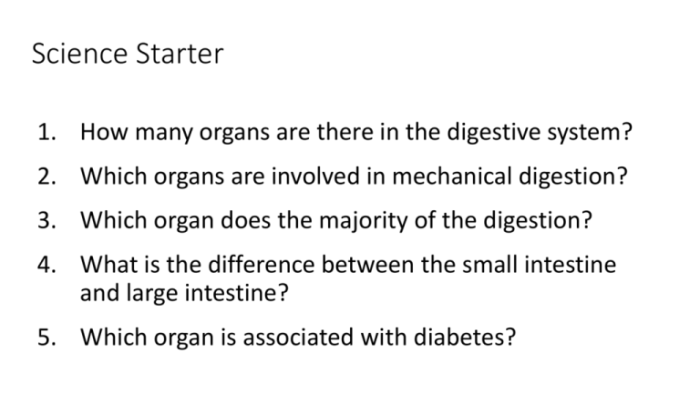Tangstar science digestive system answers – Prepare to embark on an extraordinary journey into the realm of human biology as we delve into the intricate workings of the digestive system, guided by the renowned Tangstar Science. Together, we will uncover the mysteries that lie within this vital system, exploring its anatomy, physiology, and the remarkable processes that enable us to sustain life.
From the moment we ingest nourishment to the elimination of waste, the digestive system plays a pivotal role in our overall health and well-being. Join us as we navigate the complexities of this fascinating system, unraveling the secrets of nutrient absorption, enzyme activity, and the intricate interplay of hormones that orchestrate the symphony of digestion.
Digestive System Basics
The digestive system is a complex network of organs that work together to break down food and absorb nutrients. It begins with the mouth, where food is chewed and mixed with saliva. Saliva contains enzymes that begin to break down carbohydrates.
The food is then swallowed and travels down the esophagus to the stomach.The stomach is a muscular organ that secretes gastric juices, which contain hydrochloric acid and enzymes that further break down food. The stomach churns the food, mixing it with gastric juices to form a semi-liquid substance called chyme.
Chyme then moves into the small intestine.
Key Digestive Organs
Stomach
The stomach is a J-shaped organ located on the left side of the abdomen. It is responsible for storing and digesting food. The stomach secretes gastric juices, which contain hydrochloric acid and enzymes that break down food. The stomach also churns the food, mixing it with gastric juices to form a semi-liquid substance called chyme.
Small Intestine, Tangstar science digestive system answers
The small intestine is a long, coiled tube that is responsible for absorbing nutrients from food. The small intestine is divided into three sections: the duodenum, the jejunum, and the ileum. The duodenum is the first section of the small intestine and is where most digestion and absorption occurs.
The jejunum and ileum are responsible for absorbing nutrients from food.
Large Intestine
The large intestine is a long, coiled tube that is responsible for absorbing water and electrolytes from food. The large intestine is also responsible for storing waste products before they are eliminated from the body.
Enzymes and Hormones: Tangstar Science Digestive System Answers
Enzymes
Enzymes are proteins that catalyze chemical reactions in the body. Enzymes are involved in all aspects of digestion, from breaking down food to absorbing nutrients. Some of the key enzymes involved in digestion include:
Amylase
Breaks down carbohydrates
Protease
Breaks down proteins
Lipase
Breaks down fats
Hormones
Hormones are chemical messengers that regulate various bodily functions. Hormones are involved in all aspects of digestion, from stimulating the production of gastric juices to regulating the absorption of nutrients. Some of the key hormones involved in digestion include:
Gastrin
Stimulates the production of gastric juices
Secretin
Stimulates the production of pancreatic juices
Cholecystokinin
Stimulates the production of bile
Nutrient Absorption

Nutrient absorption occurs in the small intestine. The small intestine is lined with villi, which are small finger-like projections that increase the surface area for absorption. Nutrients are absorbed into the bloodstream through the villi.The different types of nutrients absorbed in the small intestine include:
Carbohydrates
Absorbed as glucose
Proteins
Absorbed as amino acids
Fats
Absorbed as fatty acids and glycerol
Digestive Disorders
Digestive disorders are common and can affect people of all ages. Some of the most common digestive disorders include:
Irritable bowel syndrome (IBS)
A functional bowel disorder that causes abdominal pain, cramping, and diarrhea or constipation
Crohn’s disease
An inflammatory bowel disease that causes inflammation and ulceration of the digestive tract
Ulcerative colitis
An inflammatory bowel disease that causes inflammation and ulceration of the large intestine
Maintaining Digestive Health

There are a number of things you can do to maintain a healthy digestive system, including:
Eating a healthy diet
A healthy diet includes plenty of fruits, vegetables, and whole grains. These foods are high in fiber, which is important for digestive health.
Getting regular exercise
Exercise helps to keep your digestive system moving, which can prevent constipation and other digestive problems.
Managing stress
Stress can take a toll on your digestive system, leading to problems such as diarrhea and constipation. Finding ways to manage stress can help to improve your digestive health.
Questions Often Asked
What is the primary function of the digestive system?
The digestive system is responsible for breaking down food into nutrients that can be absorbed and utilized by the body.
What are the key organs involved in digestion?
The main organs involved in digestion are the stomach, small intestine, and large intestine.
How do enzymes aid in digestion?
Enzymes are proteins that catalyze specific chemical reactions in the body, including the breakdown of food into smaller molecules.
What is the role of hormones in digestion?
Hormones regulate various aspects of digestion, such as gastric acid secretion, muscle contractions, and nutrient absorption.
How can we maintain a healthy digestive system?
Maintaining a healthy digestive system involves eating a balanced diet, staying hydrated, exercising regularly, and managing stress.